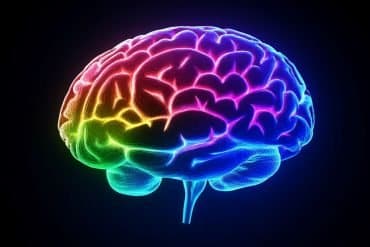Summary: A new study reveals a link between sleep and reading ability in children. Children who experienced sleep problems had lower performance outcomes on tests of reading than their peers who slept well.
Source: Wiley
New research published in the British Journal of Educational Psychology suggests that sleep problems may negatively affect children’s reading ability.
In the study that included 339 children aged four to 14 years, parents were asked to complete questionnaires about their children’s sleep, while the children completed a test of word reading efficiency.
Children whose parents reported increased sleep-disordered breathing, daytime sleepiness, and a short time for children to fall asleep (which is generally associated with increased tiredness) had poorer performance on reading tasks for both words and nonwords.
“Being a good reader is a strong predictor of academic success and improved life outcomes, so we recommend screening children with sleep problems for reading difficulties, and children with reading difficulties for sleep problems,” said corresponding author Anna Joyce, PhD, MSc, of Regent’s University London.

“Screening and treating sleep and literacy difficulties at a young age could help to improve life outcomes for all children.”
About this sleep research news
Author: Katherine Falzon
Source: Wiley
Contact: Katherine Falzon – Wiley
Image: The image is in the public domain
Original Research: Open access.
“Sleep-disordered breathing and daytime sleepiness predict children’s reading ability” by Anna Joyce et al. British Journal of Educational Psychology
Abstract
Sleep-disordered breathing and daytime sleepiness predict children’s reading ability
Background
Sleep problems are common in children and are known to detrimentally affect language and cognitive abilities, as well as academic achievement.
Aims
We aimed to investigate effects of sleep on oral word and non-word reading in a large, cross-sectional sample of children.
Sample
Of 428 children who attended a public psychological science event, 339 children aged 4–14 years (mean 8;10 ± 2;2) took part.
Methods
Parents completed two sleep questionnaires (Children’s Sleep Habits Questionnaire and Sleep-Disordered Breathing Questionnaire) whilst children completed the Test of Word Reading Efficiency.
Results
Hierarchical multiple linear regression assessed whether parentally reported sleep problems were able to predict word and non-word oral reading speeds as measures of sight word reading and phonemic decoding efficiency, respectively. Children with parent-reported increased sleep-disordered breathing, daytime sleepiness, and shorter sleep latency had poorer performance on the reading task for both words and non-words, as well as the total combined score. The models explained 6–7% of the variance in reading scores.
Conclusions
This study illustrates associations between sleep and word and non-word reading. The small but significant effect is clinically meaningful, especially since adverse factors affecting children’s reading ability are cumulative. Thus, for children with multiple risk factors for poor reading ability, sleep problems may be another avenue for treatment. Since reading ability is a strong predictor of later academic success and life outcomes, our study provides important evidence to suggest that children with sleep problems should also be screened for literacy difficulties, and children with literacy difficulties be screened for sleep problems.






